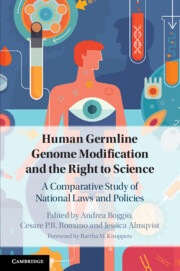 Human Germline Genome Modification and the Right to Science
Human Germline Genome Modification and the Right to Science from Part II - Europe
Published online by Cambridge University Press: 15 November 2019
This chapter discusses the regulation of germline editing in Europe, the only region in the world to date to have set up a regulatory framework for biomedical research. First, we consider the principal contributions of the Council of Europe to this framework. After a brief introduction of the history, goals and structure of this organization, we analyse key provisions of the Convention for the Protection of Human Rights and Dignity of the Human Being with regard to the Application of Biology and Medicine (Oviedo Convention) as well as its additional protocols. Relevant case law of the European Court of Human Rights related to the protection of human embryos is also taken into account. Then we turn to the European Union (EU) to examine its efforts to articulate a regulatory for biomedical research. Again, after a brief introduction to the EU, we discuss the basic elements of its framework. This includes the relevant rights included in the EU Charter of Fundamental Rights, the EU directive on the legal protection of biotechnological inventions (98/44/EC) and the EU regulation on clinical trials on medicinal products for human use (EU 536/2014), as well as significant case law of the European Court of Justice. Throughout our analysis, we highlight contradictions, gaps and unresolved issues of the current European regulatory framework, which slow down or even block scientific advancement on human germline modification in Europe. We conclude the chapter not only by pointing to the need for a public debate to address the challenges faced, but also by acknowledging the difficulties of making progress in the light of the complexity of the EU framework and the current political climate.
To save this book to your Kindle, first ensure no-reply@cambridge.org is added to your Approved Personal Document E-mail List under your Personal Document Settings on the Manage Your Content and Devices page of your Amazon account. Then enter the ‘name’ part of your Kindle email address below. Find out more about saving to your Kindle.
Note you can select to save to either the @free.kindle.com or @kindle.com variations. ‘@free.kindle.com’ emails are free but can only be saved to your device when it is connected to wi-fi. ‘@kindle.com’ emails can be delivered even when you are not connected to wi-fi, but note that service fees apply.
Find out more about the Kindle Personal Document Service.
To save content items to your account, please confirm that you agree to abide by our usage policies. If this is the first time you use this feature, you will be asked to authorise Cambridge Core to connect with your account. Find out more about saving content to Dropbox.
To save content items to your account, please confirm that you agree to abide by our usage policies. If this is the first time you use this feature, you will be asked to authorise Cambridge Core to connect with your account. Find out more about saving content to Google Drive.